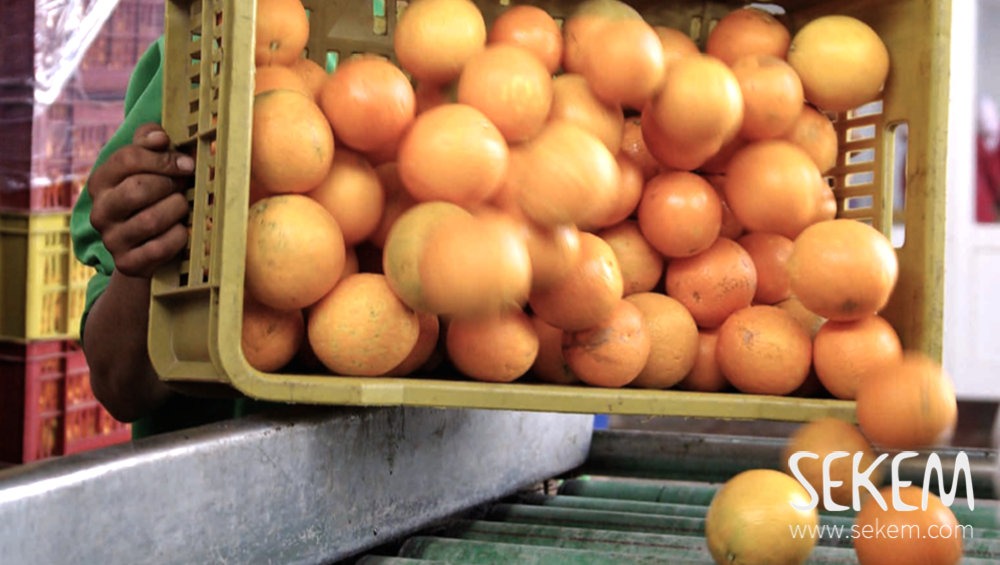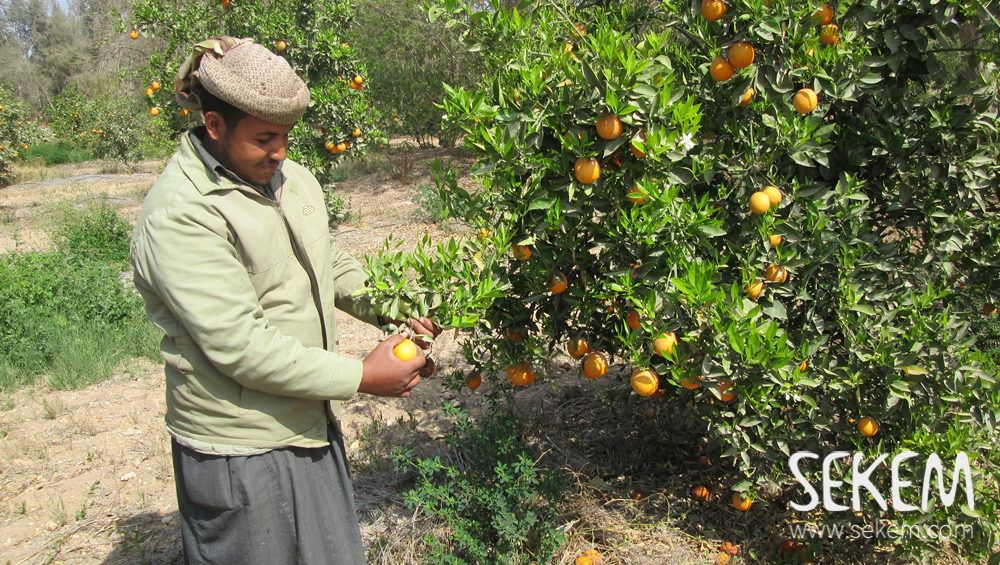Spring is the time for harvesting citrus fruits at SEKEM, first and foremost oranges. They are turned into the tasty, natural orange juice produced by ISIS Organic and shipped to local and international markets.
It is harvesting time now in Egypt for all citrus fruits including limes and particularly oranges. In January, orange trees across the country are bowing under the tremendous weight of the huge golden fruits that brightly glow in the sunlight. SEKEM runs four farms where it grows oranges. The ever-popular fruits are a good example of the sustainable and fair ways of producing agricultural produce at the initiative. It produces the precious fruits on the farm Adleja, just a few kilometres outside of the main SEKEM farm. Here, SEKEM also grows limes and vegetables next to the oranges.
Twelve co-workers attend to the small trees on Adleja in charge of the cultivation of the plants. Depending on requirements, they receive additional help from up to eight other co-workers. Among the original twelve are four agricultural engineers who instruct the others and organize the work of everyone else. “Many farmers have been with us for over 25 years. They have accumulated an extensive base of knowledge of biodynamic agriculture, which is immensely valuable to us”, says Mariam Abouleish. The young agricultural scientist is part of the team of responsible engineers. Her colleague Aied Abd El Hamed is a farmer and has been with SEKEMs group of orange growers for 26 years. For Aied, his job is his vocation: “My soul is with SEKEM. I love to work here”, exclaims the father of four. “In fact, I have the feeling that I was born to be a farmer.”
In Adleja the entire cultivation of the fields of orange trees is done by hand. Therefore, Aied is always very busy, for instance with weeding, ensuring a continuous supply of irrigation water, or with pruning the trees. In addition, the plantations regularly need to be treated with tailor-made preparations produced in accordance with the guidelines of the international Demeter federation.
Water Supply Remains Challenge
Since the government constructed a canal between the Nile and the Suez Canal several years ago, irrigation water can be drawn from the great river which flows through Egypt along its entire length and has been irrigating the fields along its banks for thousands of years. “The advantage is that this water is not as saline as that from the deep wells we also have on the farm. The desert soils tend to be extremely saline due to decades-long agricultural mismanagement”, Mariam Abouleish adds. After more than 30 years of biodynamic cultivation on the SEKEM farms, its soils can hold up to 20 percent more water than conventionally farmed ground. Such long-term agricultural achievements are of great importance in Egypt, as any cultivation relies on artificial irrigation.
Another challenge is the control of plant pests and fungi. The seedlings SEKEM grows and uses are treated in accordance with biodynamic principles, for example with a number of natural preparations including oils or micronized sulphur.
All these preparations need to be applied and their use carefully monitored. In fact, Adleja employs more people than a comparable German farm. Many farm machinery European farmers are perfectly familiar with are not available in Egypt. The farms are therefore comparatively small thus making the use of large and expensive harvesting equipment economically inviable.

In 2014, the young orange trees bore fruit for the first time. “Normally we get ten to 15 tonnes per hectare yield”, says Mustafa Al Anwar. The agricultural engineering has already been working for SEKEM for eleven years and is also a member of the Adleja team. “Last year, the acres each delivered around five tonnes of oranges. This year, we expect at least twice that quantity – but it will take another couple of years for the young trees to reach their full capacity”. The engineer especially appreciates the spirit of cooperation at SEKEM, even on the level of executive management. “We are in constant contact with each other and are often asked for our opinion. I very much appreciate that we do not only execute commands, but are always encouraged to actively share our experiences and insights”.
Respect for Nature and People Alike
SEKEMs co-workers also benefit from health insurance and regular professional education. In addition, they have the opportunity to participate in a variety of cultural activities. If one examines the fields next to the Adleja farm, one quickly notices that SEKEM does not only strive for a respectful relationship with its co-workers, but also extends these values to nature itself. It places much emphasis on clean work environments and exceptional orderliness. Many conventional farms lie adjacent to highways and are exposed to their dirt. Adleja, however, is situated along a remote country road and is surrounded by hedgerows.
Now that SEKEMs orange trees have been cultivated for five years, they can soon be harvested for the second time. First, the fruits’ sugar content is measured. Due to the Egyptian sun, SEKEM oranges are particularly zesty while also exhibiting a refreshingly sour aroma. “ISIS Organic picks up our fruits and processes them”, said Mustafa Al Anwar. “The fruits for the Egyptian market are washed, pressed, and bottled as the popular ISIS Organic orange juice.” The oranges destined for Germany, however, need to be processed in a different company as mandated by European regulations.
Agriculture a Part of Inclusive Development
With the sustainable cultivation of oranges SEKEM is making a contribution to both the improvement of working conditions in Egypt, as well as to the protection of a healthy environment. The particularly careful methods of growing oranges and the investments SEKEM makes into fair trading regimes and equitable economies make their oranges into an important part of its integrated approach to development: nature and people must be cared for not separately but together as a whole.

